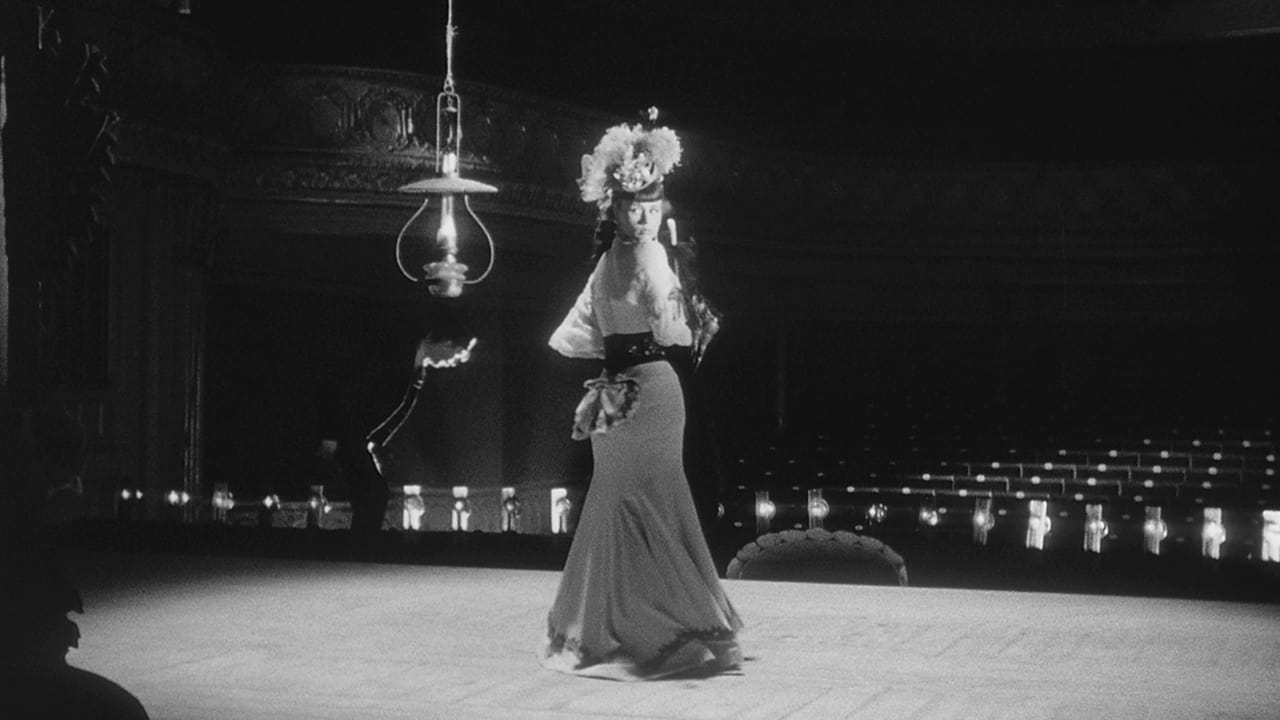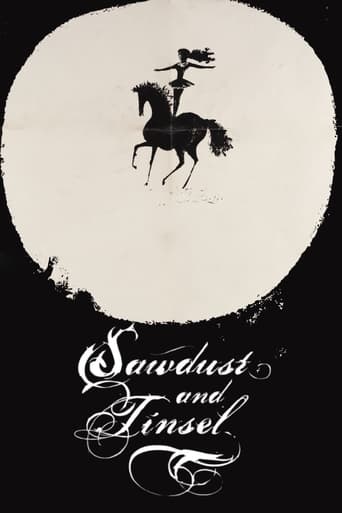Hattie
I didn’t really have many expectations going into the movie (good or bad), but I actually really enjoyed it. I really liked the characters and the banter between them.
Winifred
The movie is made so realistic it has a lot of that WoW feeling at the right moments and never tooo over the top. the suspense is done so well and the emotion is felt. Very well put together with the music and all.
Christopher Culver
That life is a circus that one cannot escape from is the overriding theme of Ingmar Bergman's 1953 film GYCKLARNAS AFTON ("The Evening of the Clowns", but released in the English-speaking world under the titles "Sawdust and Tinsel" and "The Naked Night"). As the film opens, a circus is on its way to a provincial Swedish town in the early 20th century. In an introductory sequence, a coachman tells a story of an embarrassing episode for one of the clowns and his wife, which introduces the motif of humiliation that runs throughout the film. In the ensuing flashback scene, the characters' mouths move but we cannot hear what they are saying, a tribute to silent-era director Sergei Eisenstein.Only then do we get to the main plot: circus director Albert (Åke Grönberg) will use the opportunity of revisiting this town to see his wife and children, whom he abandoned three years before. His mistress Anne (Harriet Andersson) gets jealous and wants to leave the circus, so she lets a local actor (Hasse Ekman) seduce her. The climax of the film comes with the circus performance, where all the tensions boil over, but not quite in the way I expected.This is not a mature Bergman film. Anyone expecting the great depths of his later efforts, those powerful meditations on God and interpersonal relationships, will probably be disappointed by this fairly straightforward melodrama. The symbolism is too heavy-handed and even with a mere 90-minute running time, the film seems too long for what it has to offer. I never expected to get from Bergman a long, drawn-out scene where a overstressed character sweats and swoons for what seems like forever... and then that same kind of scene is repeated again later.Nonetheless, there are some things to enjoy here. Anders Ek's performance is the most memorable here. His supporting role is as a clown with very distinctive physical gestures. It's a huge contrast to the severe priests he went on to play in two later Bergman films. One wonders if his funny way of moving his mouth inspired the buck-teethed drunks of Saturday Night Live's "Bill Brasky" skits. The music for the film was composed by Karl-Birger Blomdahl, who ultimately gained a reputation as Sweden's most controversial avant-garde composer, but here offering a score rather in the vein of Hindemith, full of references to popular dances that capture the riotous and vulgar fun of the circus performers and townspeople.Before Criterion released this DVD, the film was unavailable in the United States and known only for its original run in cinemas, where the American distributor sold it as a salacious smut film. I'm frankly baffled by this, and the 1950s must have been a very repressed era. While Harriet Andersson plays a sex kitten as times, and her entire role comes down to her looks, the eroticism is not that intense.
Ilpo Hirvonen
The famous Swedish director, Ingmar Bergman started by making films with social messages. The Naked Night is one of them, but in it Bergman looks straightly into human's soul. His cruel vision of human nature took the shape of this wonderful piece of art. But The Naked Night didn't make the critics happy and it was also a financial flop. The cruel truth didn't please the audience.It's a story about a touring circus group, which all members are in different ways dependent on each other and in result of that prisoners of each other. They all want to leave the circus and start a better life. But the attempts to detach and break free lead only lead to bigger embarrassments. The world around the group keeps it apart, because they keep attacking to it even more ruthless.This situation between the world and the circus can be seen as an allegory for our world, this is where the social stand of the film stands. But it goes a lot deeper than that, researching the soul of man and the truth of human nature. It's a survey of the cruelty of man, but it's also a story about love and jealousy.The Naked Night is European modernism, which started in the 1940's-50's. The camera-work is the best example of this. It shows true humane emotions, sweat and tears on face, anger, shame and love. The movement of the camera is also very unusual for other films of that time. Ingmar Bergman's story about the cruel truth of human nature is a true classic from the European modernistic era.
MisterWhiplash
Sawdust and Tinsel- or The Swedish Master, or The Naked Night, take your pick on a title- is about a man who can't stand himself in his profession, but loves it so much at the same time: the low-brow sensibility of it, the wildness, the freedom to cut it loose with drink or with mad gimmicks during a show, and abandon of the rules when confronted with the law. But he also has a love whom he has his problems with, and her with him as well, leading to an infidelity drama that plays out harshly. Ingmar Bergman said this was a personal film for him, in a big sense, because of the connection to the excitement of the profession being played out against personal turmoil and trouble in professional terms (Bergman even said it was easier for a scrawny director to have a "fat actor" play the part of Arthur). It was reviled by critics and a box-office flop- one of the more expensive films, relatively to others, Bergman made up to that point.It's a film that, seen years later now through the prism of Bergman as one of the world's true artists in the profession, also is deceptively high-brow about the world of low-brow, where experimentation filters in early on and Bergman makes one of his more distinctive marks as a director more-so than a screenwriter (usually, however much Bergman is always an absorbing and challenging director of scenes, writes like no other). The opening scenes, with the story of the sad/pathetic clown Frost (could be a distraction if overdone, but it's an interesting side-not throughout the film as a reminder of true melancholy), are shot like some crazy silent movie, where all we hear are sounds of laughter and little sound effects, brightly lit, shot and composed like some manic tale of desperation and defeat and humiliation, stylized so highly one might think a mad German too control of the reins and made it his own. It's not something all of Bergman's fans will like, but it shows him, even in 1953, trying new things, letting himself be free with the material as he sees fit.Then, after this, we get into the "typical" Bergmania; a sort of square-block played out between Arthur, who is meeting his ex-wife in the town he's at for the circus performance (the actress playing his wife, I forget her name, is brilliant at displaying just enough pragmatism to show her as the most sane of anyone in the film), and Arthur's current beau Anne is somewhat attracted to a sneaky actor named Frans, who plays a wicked game of arm wrestling and leading to a somewhat Albert and Anne, and how this casts a dark shadow on the rest of the proceedings- including through the circus performance, which becomes a daring act of do by Bergman where he makes things effective once squaring in on the 'duel' between Arthur and Frans. For those that love Bergman doing relationship drama, this is solid, if not exceptional, stuff on display. And the ending, truth be told, might just be one of the most engrossing, and completely bleak (if you could imagine that Bergmanites) that he ever made (who doesn't cry with the scene with the bear?) It might sound like Bergman has made a depressing little tome on circus life, the sorrows of living with the filth and lice and reckless frivolity of life as vagabond entertainers. But it's also a lot of fun, as the low-brow material displays another side to Bergman, which is something close to weird, comic excess. Sometimes Bergman even mocks his own world; a scene with Albert asking Gunnar Bjornstrand's theater director (the latter always shown in low-angle, a smart choice) makes the theater come off satirically compared to Bergman's more serious treatments of the profession in his films. And, seriously, where else will we get a dwarf tossing in a work by this filmmaker? And meanwhile, he also has a great turn from his would-be Emil Jannings in Åke Grönberg, who is big and over-emotional and strung-out on his excesses of anger and resentment, mostly with himself (watch for that gun!) And Andersson, of course, is ravishing as she was- if not erotically as such- in Monika, filmed the same year.Now finally available just a bit easier than previously thanks to Criterion, Sawdust and Tinsel is a fine spectacle of a director branching out stylistically (if not to the spectacular Felliniesque aspirations it might have as a pre La Strada or The Clowns), while keeping his feet tethered to his personal cinema. Not quite in my top 10 of Bergman's, but considering how many great films he made it's close.
TheMovieCritic_83
It's amazing when a film is disliked and misunderstood when released, and is then praised and labelled as a masterpiece decades later. Ingmar Bergman's 'Sawdust and Tinsel' is one of those films. I'm not exactly sure why the film was regarded so lowly, but thankfully, it is now recognised for what it is.The film isn't quite Bergman's best, but it is certainly close. 'Sawdust and Tinsel' is a pessimistic, yet truthful study of human nature in relationships. The film's central character, Albert, is a ringmaster of a travelling circus, and is passing through the town where his wife and children are living. The pair have been separated for some time and are clearly dealing with the situation in different ways. His wife Agda has moved on. Albert is still affected and has been unfaithful to his wife, as he is travelling along with his mistress. What unfolds is an interesting character study that looks at human insecurity, disloyalty, selfishness, unhappiness and emotional strain.It's no wonder that Ingmar Bergman is titled 'The Swedish Master'. 'Sawdust and Tinsel' is full of insight and certainly shows Bergman's talent. He does some excellent things with mirrors in certain shots and creates a lot of mood throughout the film. The highlight is, without question, one of the first scenes in which Frost, the circus clown, comes to collect his wife Alma from the ocean, where she is swimming with an army regiment. Every element works and Alma's selfishness and Frost's pain are clear in the scene, adding to the effect. Practically everything that Bergman has done in this film is excellent. The only point of criticism though, is that the cinematography is a bit hit and miss, as some scenes are too bright, giving them an overexposed look. Then again, it could be that the film has just deteriorated with age.This is an under-appreciated film that is certainly worth viewing. It is quite hard to come by, but maybe one day, someone will do a proper release on DVD.

